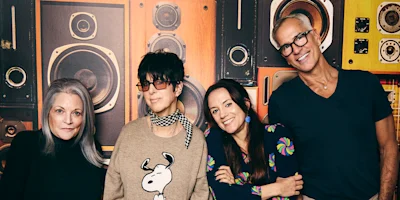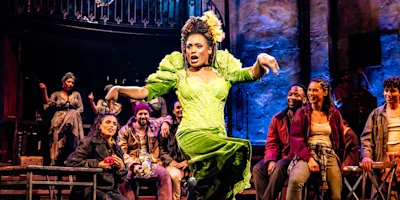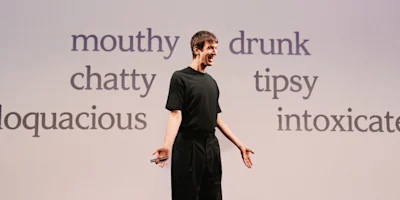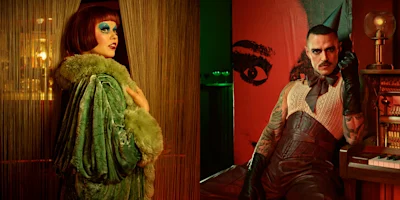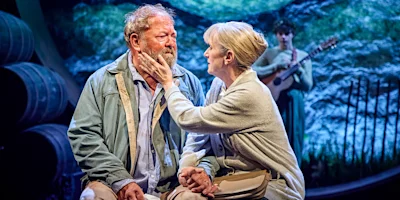
Friday Briefing: Writing scandal blooms around Tree, and how far should trigger warnings go?
Barking up the wrong Tree?
Tree, currently running as part of the Manchester International Festival at Upper Campfield Market Hall before it transfers to the Young Vic at the end of the month, was suddenly engulfed in a social media furore earlier this week, when two young writers Sarah Henley and Tori Allen-Martin posted a lengthy blog on Medium detailing how they'd been totally sidelined from the project after being involved with it for almost four years, since initiating it with actor Idris Elba.
According to this report, they signed a commissioning agreement, including the right to veto any other writer brought in and approve any changes made to the script, in March 2016. They were subsequently involved in two development workshops, held at Hackney Empire that May and then at the Dominion Theatre that November. Fast forward to May 2018, by which point the Young Vic were involved in taking it forward, and Kwame Kwei-Armah (newly installed as artistic director there) summonsed them to a meeting.
They reported: "He was friendly, warm, effusive and excited about the project. He explained explicitly that he didn't want to write it, that we were the writers and that he would dramaturg and direct the project."
But then the trail went cold, and they discovered that it was being developed without their involvement. The show was formally announced in October 2018 without their names attached to it. But they were offered the opportunity to write a new draft with no credit or creative control offered for a fee of £2,000 each. After they were unable to meet Kwei-Armah at a day's notice at the end of October, they were officially dismissed two weeks later.
After they posted their version of these events, Twitter erupted with expressions of outrage and sympathy. Of course, whoever gets the first word in sets the narrative; and puts the other party on the immediate defensive. It didn't help that a patent power imbalance exists here - and worse, between powerful men (a Hollywood movie star Idris Elba and leading artistic director Kwame Kwei-Armah) and two younger, more inexperienced women.
By the time Kwei-Armah and Elba responded, separately, on Twitter, battle lines had been drawn - and the narrative entirely rewritten.
According to Elba: "As new ambitions started to be proposed as the jumping off point for development, Tori & Sarah derided why didn't want to pursue the early thoughts and declined to work on the project further. This is not uncommon in the development process. They expressed their reasoning and we respected their decision.
"We were left without any writers and had to start work very quickly, which is our contractual right as beholder of the original idea, the album... We wanted to offer an opportunity to support these new writers while creating a work of scale and to a directors vision. The outcome is an accusation of plagiarism and discrimination."
While there is clearly a lot of mutual frustration between the parties now, there is also a bigger principle at stake than just this one story of failed communication and collaboration - and that's how younger artists can feel exploited and betrayed by older, more experienced ones.
In an editorial for The Stage, editor Alistair Smith wrote: "Too often, artists at the bottom of the career ladder are treated as an infinite, disposable resource: their time is undervalued and their contribution under-recognised... Let's hope that Kwei-Armah and his colleagues can find a way to reach out and rebuild its relationship with these young writers - it is undoubtedly their responsibility as those with more power and experience."
As for those young writers, they've boldly spoken out in a way that they were actively discouraged from doing: as Sarah Henley told the New York Times, "There was so much fear before doing this. We talked to a lot of people and most said, 'You'll get blacklisted'."
READ MORE
More trigger warnings in theatre
The Guardian reported this week that the Donmar Warehouse is newly offering "content advisories" on its website for current and forthcoming productions that audiences may want to be aware of before they book.
For its current play, Europe (that opened last week), for example, it offers these notes:
- In the first half of the play, a man repeatedly places his hand on a woman's leg, to her discomfort.
- In the second half of the play, a man beats up another man due to his status as a migrant.
- In the second half of the play, a man describes a violent attack on a woman.
The theatre's executive producer Henny Finch insists that the intention is "just about being considerate to all audiences, and making sure that everybody feels comfortable, and making the theatre as accessible as possible. Hopefully, they give people enough information about whether they want to prepare themselves for a show, or decide whether or not they want to come."
In the same piece, I'm quoted by The Guardian saying: "Theatre is all about surprise and by accommodating the sensitivities of some of its audience it could be ruining that surprise. You can't protect people from everything. It will ruin the theatre."
This isn't, of course, that theatres have wrestled with these issues. In 2017, the Royal Court posted a paragraph about trigger warnings on their website and invited audiences to contact them if they were concerned.
"We don't want to spoil anyone's experience of a new play at the Royal Court and therefore avoid giving too much away when promoting the play. It's often the unexpected shared moments and plot twists that capture the audience and create the debate and conversation beyond the performance. However, we're also conscious that these moments can be particularly distressing for some individuals. If there are certain themes that you know would cause you extreme distress and you'd like to speak to one of the Royal Court team to find out more about a show before you book, call the box office or email us."
As I wrote at the time: "Theatres routinely warn theatregoers of the use of loud sounds, strobe lighting or stage nudity, but how far can they go beyond this? Do audiences for King Lear, in which Gloucester has his eyes gouged out, need to be warned about this extreme violence? Of course we know it's make-believe: this is the theatre, after all. But it still didn't stop scores of theatregoers fainting during Shakespeare's Globe's production of Titus Andronicus in 2014."
Originally published on

